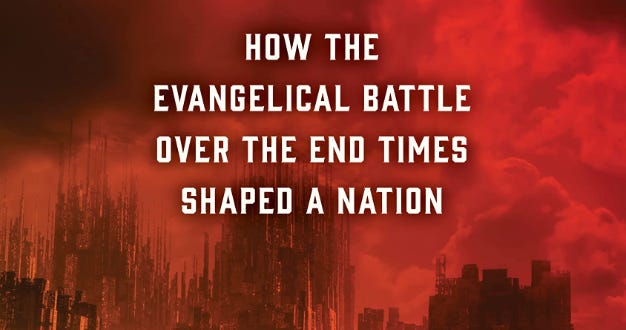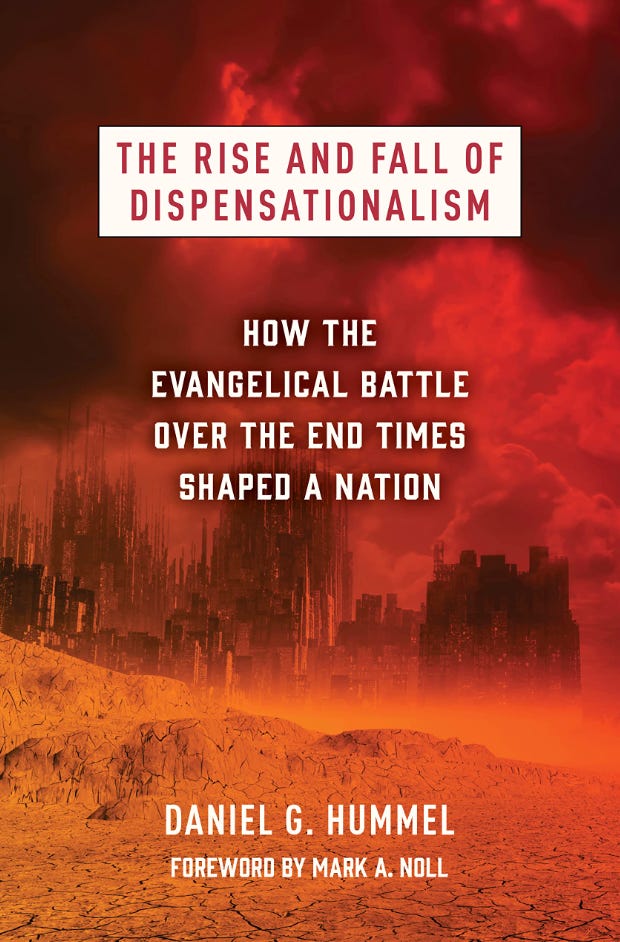When most people hear the word dispensationalism, they think of the version published by Hal Lindsey. Recently, a podcaster ask me to define dispensationalism. I mentioned three elements, only the third of which is what most people think dispensationalism is.
The three elements are, first, the work of God on earth with Israel as an earthly reality, and the work of God with a spiritual people of God, the church, who will be raptured. This earthly-spiritual division is only discussed among scholastic dispensationalist. In my reading of dispensational books, the best explanation I have ever seen of this earthly-spiritual element of dispensationalism was in the book by Darrell Bock and Craig Blaising called Progressive Dispensationalism. In fact, because I know Darrell, I often cite his name first even though Blaising is first on the book. Again, the problem is that most who talk about dispensationalism don't ever talk about this earthly-spiritual division.
Second, another way of looking at dispensationalism is to see it as a way of reading the Bible through various periods of God's working with humans on earth. Classically, there are seven periods. Third, when most people think of dispensationalism they think of pop dispensationalism, and that means they think of terms like rapture, the great tribulation, the Millennium, the Antichrist, and the battle of Armageddon.
In today's Substack, I will look at a chapter about pop dispensationalism by Daniel G. Hummel,The Rise and Fall of Dispensationalism: How the Evangelical Battle over the End Times Shaped a Nation. He rightfully concentrates on Hal Lindsey. I have a quibble about this, and I will mention it below.
Hal Lindsey wrote The Late Great Planet Earth in 1970. In that decade alone it's sold 10 million copies, and by the end of the century it had sold nearly 30 million copies. As a college student, I saw dozens of copies of this book on the floor and on shelves at Zondervan's store in downtown Grand Rapids. If you wanted one, I think the clerks would just give you one for asking.
One of the major themes of Hummel's book is that the commercialization and entrepreneurship of pop dispensationalists decreased the credibility of dispensationalism itself, even though pop dispensationalism was a long way from the more academic, scholastic version of dispensationalism taught at Dallas Theological Seminary. Because dispensationalism has become so popular, anyone addressing a different understanding of the Book of Revelation has to engage the more populist version of dispensationalism. Which is what Cody Matchett and I did in Revelation for the Rest of Us.
Lindsey’s book captured an ability to speak of geopolitical realities like the Arab-Israeli 1967 War, national trends like the fear of communism, and the moral crisis created by the 1960s and 1970s, not least in California where Lindsey had ministered at UCLA and then with Chuck Smith at Calvary Chapel. Lindsey’s prose, fine-tuned by his co-author (Carole C. Carlson), moved the book away from scholastic dispensationalism into pop dispensationalism.
At the heart of Lindsey 's speculative predictions that he saw coming to pass, or almost coming to pass, were, first, the return of the Jewish people to the land of Israel; second, the near capture of the entire city of Jerusalem in 1967; and third, the supposed rebuilding of the temple. These three features were present in most versions of pop dispensationalism. The first two have been proven false, and very few believe in the 3rd today. Even among dispensationalists.
Lindsey's book spawned many other authors, who also wrote fiction or near fiction. Authors like Tim LaHaye, Zola Levitt, and Chuck Smith. One noteworthy detail, which I mentioned above, is that two years earlier than Hal Lindsey’s famous book was Salem Kirban who wrote in 1968, Guide to Survival, a book designed for people who were not raptured and who wanted to make sense of the tribulation. And, in 1970 Kirban wrote a book called 666, later writing 1000. In effect, Lindsay capitalized on the book of Salem Kirban. And Larry Norman wrote “I Wish We’d All Been Ready” in 1969! Someone, I hope, has sought to show the relationship of Lindsey to his predecessors, especially Kirban.
Most of you know of A Thief in the Night, which in 1972 turn Lindsey 's book into a low budget movie. Hummel observes that that movie has been seen by 100 million viewers.
That's what we mean by pop dispensationalism, and we cannot deny the impact and influence of this version of dispensationalism on American evangelicalism, on American Christianity in general, and not least on American political perceptions of international relations.






All I can say is yup, yup, yup!!! Lived through those days as a new Christ-follower. As with so many other cultic, short-term attractions I have seen in American Evangelical Christianity, it ran its popularity course but there is still a bedrock of folks who 'believe" your third point of the outline is true or, at least, confess such. Thank you for bringing reality to scripture and particularly, Revelation. I am so tired of hearing the populist rhetoric spewed from the pulpit drowning out sound teaching.
This is an excellent essay, Scot. I’m appreciative you’ve included Chuck Smith at this level, as too many others don’t recognize his influence in this. Thank you. By the way, your recent book does for reality, and discipleship, what Lindsey’s LGPE did for pop. Thank you for such a monumental and needed work.